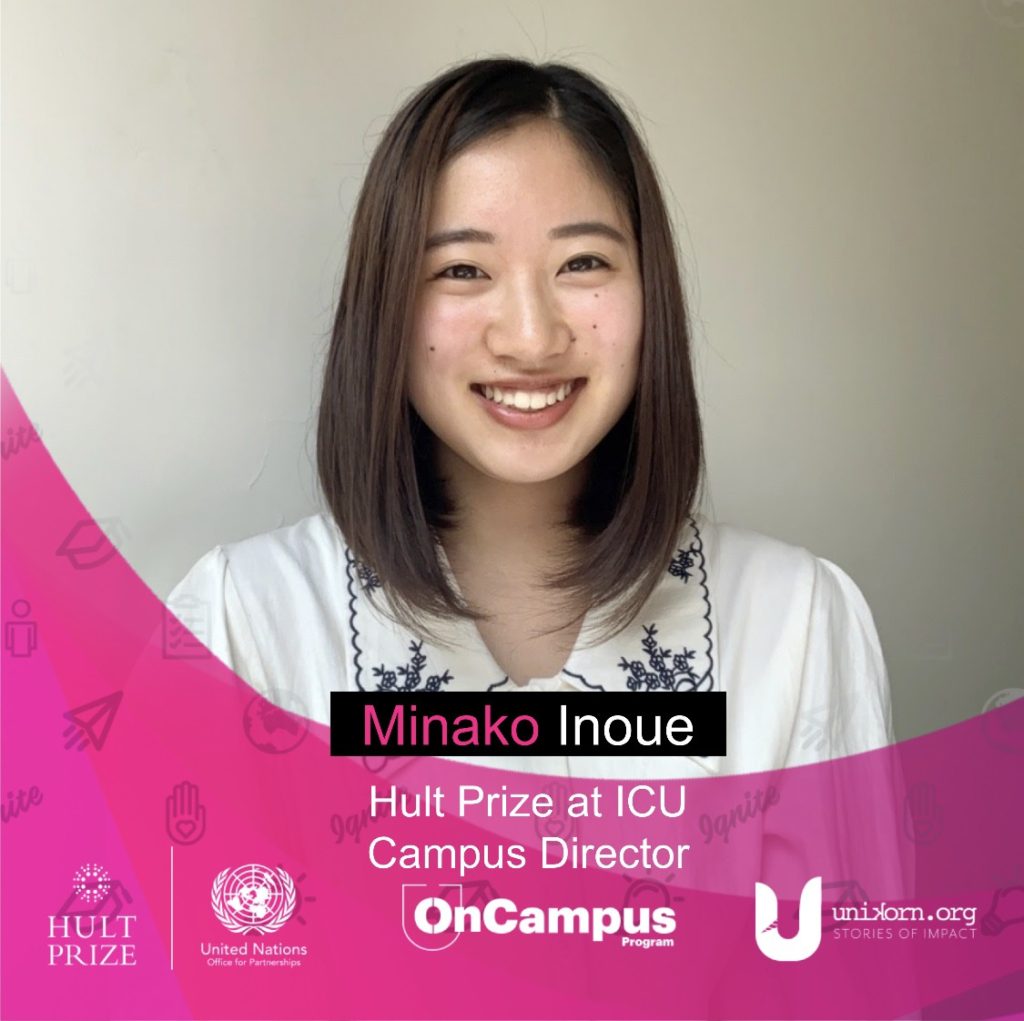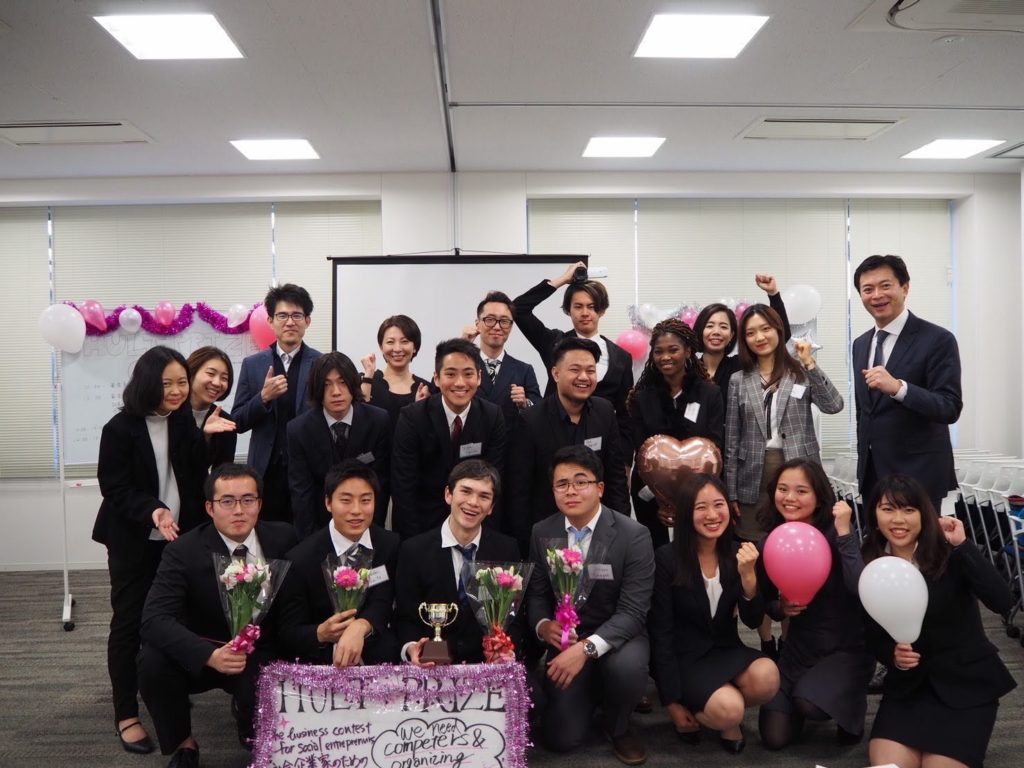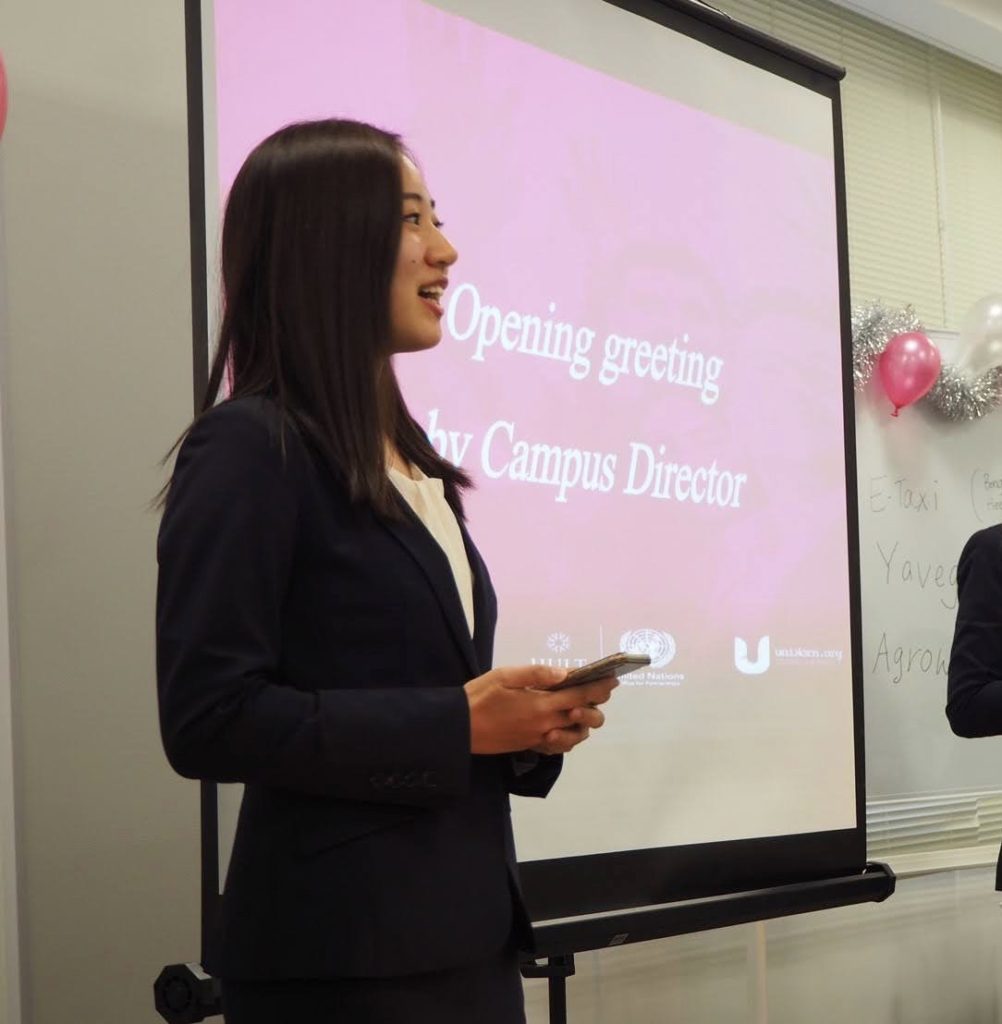A Campus Director of the Hult Prize, Minako Inoue Shares Insights on How to Foster Entrepreneurship at ICU.
ICONfront interviewed Minako Inoue, a campus director of Hult Prize at ICU. This article talks about the background story of joining to Hult Prize, how she feels as a director, and the relationship between social issues and business.

Q1. Please tell us about your activism.
I am working for a project called Hult Prize at ICU as Campus Director. The Hult Prize is a large-scaled worldwide business competition that fosters student entrepreneurship and has many branches in different universities. I am also working as a leader at the ICU branch. My main jobs are to manage the competitions at ICU, looking for participants, mentors, and judges, planning events, and supporting participants.
Q2. What is the Hult Prize?
As I mentioned before, the Hult Prize is one of the largest business competitions for social entrepreneurs. The word “for social entrepreneurs” is the key point and the purpose is to solve social issues through business orientation. The scale of our project is expansive, since more than 1000 universities from more than 100 countries participate in the Hult Prize every year. The entrant universities in Japan have been increasing year by year, with 50 universities participating last year.
The World Competition is a year round competition. It is first held at ICU and then the winning team does an intensive training camp with mentors for one month. Next, the chosen team is given a ticket to the final. The winning team at the final round will receive a hundred million yen for their project. What surprises me the most is that students manage most of the competition. We invite specialists related to the theme of the year as a panel of judges.
Q3. What do you do in ICU?
We manage the contest held at ICU. Now, we have four ID23 members. I heard that the Hult Prize at ICU started 3 years ago, so it is a relatively new organization.
One of the points to consider when holding the contest is that support for the participants is necessary. It is difficult for most students to come up with ideas without research in depth, so we have asked specialists to give lectures about the theme of the contest.
In addition, we give advice in terms of how to make an impactful presentation. In the Hult Prize, we accept not only students who already have business ideas but also students who would like to do something, to have teammates, or to be involved with adults in the business world. This is the difference compared to other business contests.
Q4. What made you decide to start your activism?
Since the beginning, I have been interested in studying management and planning events, so being the leader for the Hult Prize was a good opportunity for me to challenge myself.
Recently, I have been working on entrepreneurship, but initially I was interested in business leadership and team building. This is because I had experience in team sports, and my intention was to study such areas academically. This is also the reason why I chose to work as a manager. As a manager, I can be involved in the management of participants and work on team building at the same time. Business contests often deal with financial profit, but I am also interested in how people work and interact, so I intend to study sociology as well.
Q5. Do you feel that entrepreneurship is taking root in ICU?
I don’t think so. There are many students who are interested in working for NPO and NGO, but in terms of starting a business, they might think it’s too challenging for them. . In addition, many ICU students are interested in social issues, but most of them do not think that those issues can be connected to business.
Q6. Some people think that “solving social issues” and “business” seem to be incompatible at first glance. What do you think about the balance between them?
At first, I had doubts if social issues and business were compatible. However, as I became more involved in the Hult Prize, my impression has changed. Focusing on social issues enables us to think about social needs, so I realized that social issues and business are surprisingly compatible.
However, it is not easy for participants to connect social issues and profit-making, so the lectures held by us before the competition helps participants to connect the two. You will be surprised to see the participants talking about how they can pursue both profit and sustainability in detail at the competition.
Q7. So, the judges evaluate the plans not only by the novelty of the idea, but also by the reproducibility and/or sustainability?
Yes, the idea and originality are, of course, important. But at the same time, it is also necessary to anticipate the questions that will be asked by the judges and prepare for them carefully. One team surprised me because they brought a prototype to explain their plan in detail.
Q8. What was the business plan of the champion team last year?
The previous champion presented a business plan to reuse banana peels, which would be discarded, to make recyclable plastic wraps. They had contacted a local factory to negotiate beforehand and did detailed planning. At the tournament, they actually brought the saran wrap they had made as a prototype. By doing so, their feasibility was well received by the judges and became the 2019 champion.
After being chosen as a campus champion, they will then participate in the regional tournament. By passing the screening at this tournament, they will be able to participate in a program called “Accelerate Program”. When they are chosen as an outstanding team during this program, they will finally get the ticket to attend the Final Round, held at the United Nations.

Q9. The FInal Round is to be held in August. Were there any schedule changes due to the Covid-19?
The regional tournament, which was supposed to be held in Tokyo in March, was canceled. The other tournaments left also had to be switched to online competitions. Since this is the first time to be held online, as the Hult Prize, it is still not clear how the tournament will look like in detail. I think a new kind of support will be needed for the participants, because participating in tournaments in countries overseas, is one of the attractiveness of the Hult Prize.
Q10. What has been the hardest thing as a member and campus director of the Hult Prize?
Actually, I am not satisfied with what we did last year as the Hult Prize members. Our management team didn’t have an organized schedule to run the tournament, so my associate and I finished the preparation just before the tournament and didn’t have time to spare.
The hardest thing was asking the professional entrepreneurs to mentor the participants. Although we did not have any experience in visiting their workplace, or persuading the professionals before, our freshmen group was able to gather several mentors. We felt nervous at first, but felt a great sense of accomplishment when we were able to get an approval from the professionals.
Q11. Which skill(s) do you think would be essential for being a leader?
As a leader, I think it is important to rely on members, especially because I tend to do all tasks by myself. When I ask members to do some of my tasks, I try not to force them to do the task but I ask them with respect and trust. Without the feeling of reliance, members are not going to have the motivation and responsibility towards the tasks. Therefore as a leader, I keep in mind to entrust members to do the tasks.
Q12. What is going to be your challenge as the ICU’s campus director?
From what we have done last year, I would like to plan well ahead. Because ICU will still be online, we need to change the way in which we did last year. I am not pessimistic about being online, and think that it is a chance for us, since 1) there is no need to reserve a place/room for lectures, and 2) the lecturers do not have to come all the way to ICU.
Q13. Please tell us what you are interested in at the moment and if there are any messages to ICU students!
Personally speaking, I am looking forward to seeing business plans from a new perspective, such as coronavirus × entrepreneurship, since many things have been cancelled due to the pandemic.
If you have a slight interest in social problems, please consider participating in the Hult Prize. You do not necessarily need to have a deep interest in entrepreneurship.

Check out the Hult Prize Instagram and Facebook here.
Instagram account:https://www.instagram.com/icu_hultprize/?hl=en
Facebook account:https://www.facebook.com/hultprizeICU